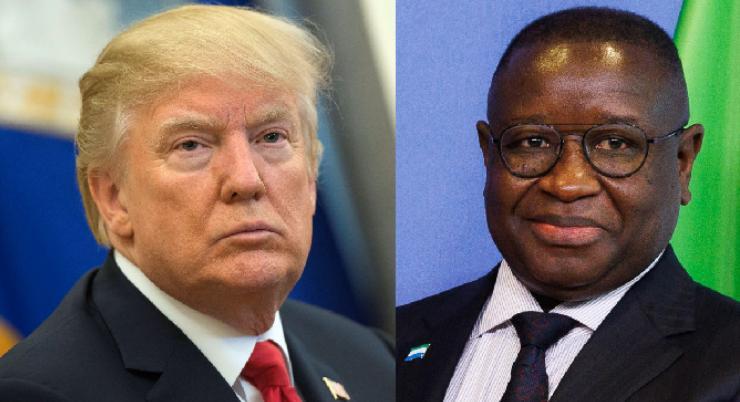Africa-Press – Sierra-Leone. The U.S. Department of State’s Bureau of Democracy, Human Rights, and Labor has released its 2024 Country Reports on Human Rights Practices, highlighting both progress and ongoing concerns in Sierra Leone.
While there were no credible reports of arbitrary or unlawful killings by the government or its agents, unlike the previous year, significant human rights issues, including credible reports of arbitrary arrest or detention, persist. The government has taken some steps to address abuses, but impunity remains a problem.
Regarding freedom of expression, the constitution and law generally provide for and respect this right. However, there were instances of concern, such as the June arrest and detention of a lawyer by the Sierra Leone Police (SLP) Criminal Investigation Department on allegations of cyberstalking the president and the bar association leader, following a tweet questioning their legitimacy.
Local NGOs protested this arrest, citing concerns about its impact on freedom of expression, and the lawyer was subsequently released on bail. In February, the SLP also arrested the editor of the “Night Watch Newspaper” after the publication of a controversial article; the editor was released from police custody within a week.
In terms of worker rights, the law provides for the right of workers to join independent unions, bargain collectively, and conduct legal strikes. The government generally protected the right to bargain collectively and to strike, with collective bargaining being widespread in the formal sector. However, the law does not prohibit discrimination against union members or employer interference in union establishment.
While the government generally respected freedom of association, it did not consistently enforce applicable laws through regulatory or judicial action, particularly regarding the right of private sector workers to form or join unions. Penalties for violations of association, bargaining, and strike rights were less severe than for analogous civil rights violations and were sometimes applied against violators.
Regarding acceptable work conditions, a national minimum wage exists but falls below the basic poverty line. The customary workweek is 40 hours, though 60 hours for security personnel, and there is no statutory definition for overtime wages beyond 40 hours. Violations of wage, hour, and overtime laws were common in informal artisanal diamond mining, domestic work, and agriculture. Occupational safety and health (OSH) standards generally appropriate for the main industries are lacking , and the government does not proactively identify unsafe conditions, only responding to worker complaints, if at all.
Workers also cannot remove themselves from dangerous situations without jeopardizing their employment. NGOs reported common OSH violations in the health, medical, and mining sectors. The government did not effectively enforce minimum wage, hour, and OSH standards, particularly in informal sectors, and penalties for noncompliance were not commensurate with those for similar violations. Penalties were rarely applied against violators. The Ministry of Labour and Social Security, responsible for enforcement, has an insufficient number of labor inspectors. Approximately 90 percent of laborers work in the informal sector.
There were no reports of enforced disappearances by or on behalf of government authorities.
Prolonged pretrial detention remains a significant problem. While the constitution and law prohibit arbitrary arrest and detention and provide for the right to challenge the lawfulness of detention, organizations like Prison Watch Sierra Leone (PWSL) and Defense for Children International Sierra Leone (DCISL) reported issues. PWSL noted that the government generally observed requirements for adults, but DCISL reported indiscriminate detention of children as a significant problem.
Although warrants are required for searches and arrests, the HRCSL reported some arrests without warrants and suspects being held beyond the legally mandated period. Detainees are not always promptly informed of charges against them. NGOs reported that lawyers generally had unrestricted access to detainees. Pretrial and remand detainees spent an average of two to three years in pretrial detention before their cases were examined or formal charges filed, frequently exceeding the maximum sentence for the alleged crime. The law also allows for the indiscriminate detention of juveniles if an officer believes their release would “defeat the ends of justice,” leading to lengthy detentions.
The law prohibits torture and cruel, inhuman, or degrading treatment. However, impunity remains a significant problem within the security forces, particularly the SLP. In September, the Family Support Unit (FSU) of the SLP reported two accusations against police officers for physical and sexual abuse of children, with investigations ongoing at year’s end. The law does not prohibit female genital mutilation/cutting (FGM/C) for women or girls. According to local NGOs, as of February, 83 percent of women and girls ages 15 to 49 had experienced FGM/C, a decrease from 90 percent in 2013.
Regarding child marriage, the legal minimum age is 18. In June, the adoption of the Prohibition of Child Marriage Act rectified an anomaly allowing children under 18 to marry with parental permission. The new law prohibits marriage or cohabitation with a child, even with parental permission, and provides counseling and safeguarding services, which authorities began effectively enforcing after its passage. Girls from poor rural families are most likely to be married before age 18.
The government cooperated with the Office of the UN High Commissioner for Refugees and other humanitarian organizations in providing protection and assistance to refugees, returning refugees, asylum seekers, and other persons of concern. The law provides for granting asylum or refugee status, and the government has a system for protecting refugees. There were no reports of antisemitic incidents.
For More News And Analysis About Sierra-Leone Follow Africa-Press






